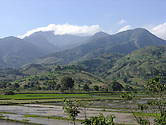Oct 7 2008
Up to 500,000 hectares of moist and spiny forests in Madagascar are to be protected or restored in a pioneering project which will include testing ways to measure climate impacts.
 Rice cultivation (forefront) and deforestation on the hillsides of a moist forest near Fort Dauphin, in South-east Madagascar
© WWF/Mark Aldrich
Rice cultivation (forefront) and deforestation on the hillsides of a moist forest near Fort Dauphin, in South-east Madagascar
© WWF/Mark Aldrich
The research could potentially provide precious information to many other forest-carbon projects around the world.
The three-year project is funded by GoodPlanet – with Air France as sole sponsor – and implemented by WWF. GoodPlanet is a French foundation which aims to raise public awareness on the world’s current main issues and promotes sustainable development.
“With deforestation responsible for 20% of global greenhouse gas emissions, there is a growing interest to use forests as an instrument to fight against global warming,” said Matthieu Tiberghien, Programme Officer at GoodPlanet. “However, we must ensure that we have the proper methodologies to assess the level of greenhouse gas emissions that can be reduced by reducing deforestation.”
Activities to be carried out include the creation of new, community managed, protected areas, the transfer of forest management rights from Government to local communities, the establishment of fuelwood plantations to reduce pressure on natural forests and the restoration of forests in some key degraded landscapes.
WWF and GoodPlanet will join efforts and expertise to acquire as much knowledge as possible on verifiable ways to measure how much the emission of carbon can potentially be reduced by reducing the rate of deforestation and degradation, and how much carbon can be effectively and permanently sequestered by complementary forest restoration activities.
According to estimates by the Intergovernmental Panel on Climate Change (IPCC) and various studies in Madagascar, the carbon storage potential of the forests in the project area could be between 61 to 68 million metric tons.
The current deforestation and degradation of forests in the project area is mainly caused by local slash and burn agriculture. The project seeks to reverse this situation by giving the farmers and communities direct, better, access to the management of forests and their natural resources, and by promoting alternative, sustainable and income-generating agricultural practices, such as agro-forestry.
“When local communities have the responsibility to manage their natural resources, they tend to protect them better and use them in a sustainable way,” said Nanie Ratsifandrihamanana, WWF’s Conservation Director in Madagascar. “This in turn ensures them additional revenues and improves their living conditions.”
Farmers in the project’s key landscapes will be trained to establish and maintain tree nurseries for reforestation activities and restoration of degraded landscapes. Plantations will also be established in degraded areas close to urban areas in order to provide fuelwood for the cities and towns where there is high demand, thus providing an alternative to the wood that would otherwise be directly extracted from the natural forests.